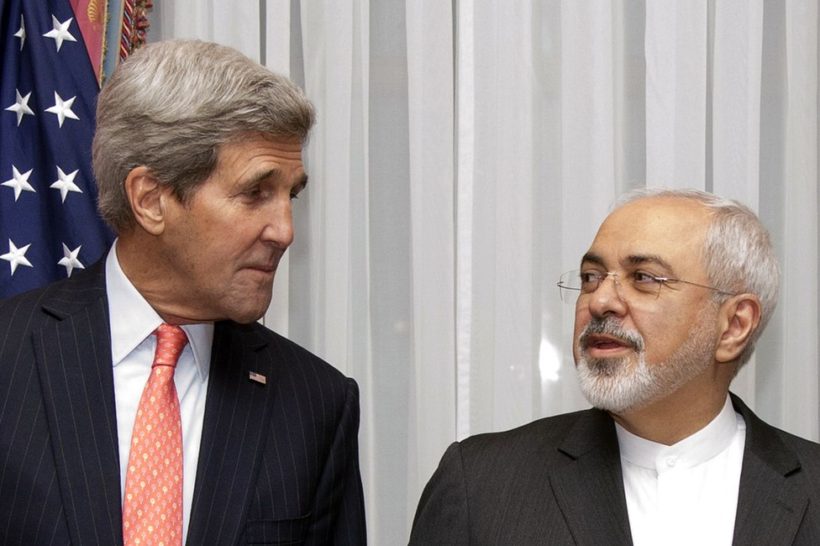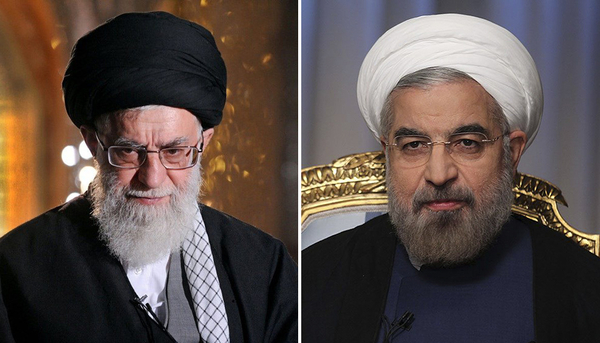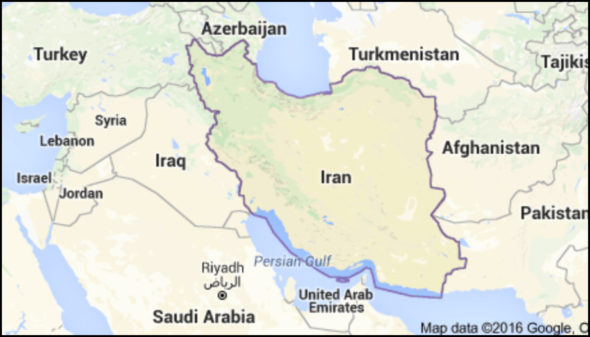
U.S. Secretary of State John Kerry and Iran's Foreign Minister Mohammad Javad Zarif. Secretary Kerry has said some sanctions relief is likely to go to terrorists.
redo Jump to...
print Print...
(Associated Press) DAVOS, Switzerland — US Secretary of State John Kerry said Thursday it is likely that some of the billions of dollars in sanctions relief granted to Iran under a landmark nuclear deal will go to groups deemed terrorists.
Kerry said on the sidelines of the World Economic Forum that there is little the United States or others could do to prevent the now-unfrozen assets from getting into the hands of the Iran Revolutionary Guard Corps or “other entities” that Iran has supported in the past. But since nuclear-related sanctions were lifted on Iran last weekend, Kerry said there was no evidence yet to suggest such transfers had occurred.
“I think that some of it will end up in the hands of the IRGC or other entities, some of which are labeled terrorists,” he told CNBC television in an interview. “You know, to some degree, I’m not going to sit here and tell you that every component of that can be prevented. But I can tell you this, right now, we are not seeing the early delivery of funds going to that kind of endeavor at this point in time.”
Kerry also said that many critics of the Iran deal were inflating the amount of money that Iran now has access to. He said estimates of $100 billion to $150 billion were incorrect — $55 billion was more accurate, he said — because large chunks of that money is obligated to satisfy foreign debt.
In addition, he said Iran has more than $500 billion in infrastructure and development needs and must invest at least $100 billion to modernize its energy sector.
Earlier Thursday, Kerry rejected Iranian criticism of Washington’s use of economic sanctions, saying they are imposed when appropriate.
Kerry said US penalties against Iran and other nations have been “used judiciously and effectively” and will continue to be used in the future.
“We have made it very clear that we use sanctions when we think they are appropriate in order to counter behavior that we believe has broken the law or has challenged the United Nations Security Council or threatened the United States and we stand by our sanctions,” Kerry told reporters.
“We think they have been used judiciously and effectively and we are looking to move on now to put to test the willingness of Iran and other countries in the region to try to reduce tensions and move in a different direction.”
His comments came in response to a complaint lodged a day earlier by Iranian Foreign Minister Mohammad Javad Zarif who told The Associated Press in an interview that new US sanctions over Iran’s ballistic missile testing are “illegal” and an example of an American “addiction to coercion.” The penalties were imposed Sunday, a day after the US and other nations lifted sanctions over Iran’s nuclear program.
“It shows that the United States has an addiction which has been very difficult for it to overcome,” Zarif said. Washington, he said, suffers from an “addiction to pressure, addiction to coercion, addiction to sanctions.”
US officials say Iran’s missile test in October violated UN Security Council restrictions on such activity.
Copyright 2016 the Associated Press, at The Times of Israel. Reprinted here for educational purposes only. May not be reproduced on other websites without permission from the Associated Press.
Questions
1. Read the “Background” below the questions. What is known about the Iranian government’s relationship with terrorist groups? Be specific.
2. President Obama negotiated an executive agreement with Iran to drop sanctions against the country in exchange for a promise that Iran would put limits on its nuclear programs for at least ten years. How much money is Iran getting back now that the sanctions are dropped?
3. a) What is the IRGC? What accusations have been made against the IRGC?
b) What did U.S. Secretary of State John Kerry admit Iran will use some of the money for?
4. How does Secretary Kerry defend this concerning news?
5. Secretary Kerry also said, “We have made it very clear that we use sanctions when we think they are appropriate in order to counter behavior that we believe has broken the law or has challenged the United Nations Security Council or threatened the United States and we stand by our sanctions.” Ask a parent: Do you support the Obama administration’s push to drop the long-standing sanctions on Iran in exchange for a promise to hold parts of its nuclear program? Explain your answer.
Background
IRAN GOVERNMENT’S ROLE IN TERRORIST ACTIVITIES:
- Since the Iranian Revolution in 1979, the government of Iran has been accused by members of the international community of funding, providing equipment, weapons, training and giving sanctuary to terrorists.
- The US State Department describes Iran as an “active state sponsor of terrorism.” When US Secretary of State, Condoleezza Rice stated, “Iran has been the country that has been in many ways a kind of central banker for terrorism in important regions like Lebanon through Hezbollah in the Middle East, in the Palestinian Territories, and we have deep concerns about what Iran is doing in the south of Iraq.”
- In July 2012, the United States State Department released a report on terrorism around the world in 2011. The report states that “Iran remained an active state sponsor of terrorism in 2011 and increased its terrorist-related activity” and that “Iran also continued to provide financial, material, and logistical support for terrorist and militant groups throughout the Middle East and Central Asia.”
- In August 2012, Ayatollah Ali Khamenei instructed the Revolutionary Guards and Quds Force to increase their terror attacks due to what the Iranian government perceived as their interests being threatened by United Nations sanctions and the West’s support of Syrian opposition.
- Iran does not recognize Israel as a state. The U.S. State Department states Iran provides support for terror groups Hamas, Hezbollah and Palestinian Islamic Jihad in Israel. (read more at wikipedia)
IRGC (Iran’s Revolutionary Guards):
- The Army of the Guardians of the Islamic Revolution, often called Revolutionary Guards or Iranian Revolutionary Guard Corps (“IRGC”) is a branch of Iran’s Armed Forces, founded after the Iranian revolution in 1979.
- Whereas the regular military defends Iran’s borders and maintains internal order, according to the Iranian constitution, the Revolutionary Guard is intended to protect the country’s Islamic system.
- The Revolutionary Guards state that their role in protecting the Islamic system is preventing foreign interference as well as coups by the military or “deviant movements.”
- The IRGC has been accused of smuggling, training and supplying Hezbollah and Hamas terrorists, and of being involved in the Iraq War. (wikipedia)
THE WORLD ECONOMIC FORUM:
- The mission of the World Economic Forum is cited as “committed to improving the state of the world by engaging business, political, academic, and other leaders of society to shape global, regional, and industry agendas.”
- The Forum is best known for its annual winter meeting in Davos, a mountain resort in the eastern Alps region of Switzerland.
- The meeting brings together some 2,500 top business leaders, international political leaders, selected intellectuals, and journalists to discuss the most pressing issues facing the world.
- Al Gore, Bill Clinton, Bill Gates, Bono, and Tony Blair also are regular Davos attendees.
- Often this location alone is used to identify meetings, participation, and participants with such phrases as, “a Davos panel” and “a Davos Man”.
- The organization also convenes some six to eight regional meetings each year in locations such as Latin America and East Asia, as well as undertaking two further annual meetings in China and the United Arab Emirates. (wikipedia)
IRAN’S NUCLEAR PROGRAM:
- In 2002, the world discovered that Iran’s had been conducting a 20 year secret nuclear program.
- Iran says its program is for fuel purposes only, but it has been working on uranium enrichment which is used to make nuclear bombs. [Enriched uranium is a critical component for both civil nuclear power generation and military nuclear weapons.]
- Under the United Nations’ NPT (Non Proliferation Treaty) countries are not allowed to make nuclear weapons (except for the 5 that had nuclear weapons prior to the treaty – the U.S., Russia, China, France, the United Kingdom).
- Safeguards are used to verify compliance with the Treaty through inspections conducted by the UN’s nuclear watchdog, the IAEA (International Atomic Energy Agency).
- The IAEA has consistently stated it is unable to conclude that Iran’s nuclear program is entirely peaceful.
- The IAEA issued a report on Sept. 15, 2008 that said Iran has repeatedly blocked an investigation into its nuclear program and the probe was then deadlocked.
- The U.N. Security Council has already imposed four sets of sanctions on Iran over its nuclear defiance. Despite the sanctions, Iran has refused to end its nuclear program.
- A group of U.S. and Russian scientists said in a report issued in May 2009…said Iran is making advances in rocket technology and could develop a ballistic missile capable of firing a 2,200-pound nuclear warhead up to 1,200 miles “in perhaps six to eight years.”
- When nuclear talks between Iran and Western governments were stalled and seen as a failure again in 2015, they were cited as a reason to enforce stronger economic sanctions on Iran.
- Then, on April 2, 2015, the P5+1 and Iran, meeting in Switzerland, reached a provisional agreement on a framework that, once finalized and implemented, would lift most of the sanctions in exchange for limits on Iran’s nuclear programs extending for at least ten years. As a result, UN sanctions were lifted on January 16, 2016. To do the deal, the Obama administration sidestepped Congress, which opposed dropping the sanctions against Iran. President Obama used an executive agreement to make the deal with Iran. Opponents say there is no way to ensure Iran will live up to its part of the agreement, as they are allowed to “self-monitor” their nuclear program.
- The Iranian government has called for the destruction of Israel on numerous occasions. It is believed that once obtained, the Iranian government would use nuclear weapons against Israel.
Resources

Iran’s Supreme Leader Ayatollah Ali Khamenei (left) is the second and current Supreme Leader of Iran and a Muslim cleric. (On June 4, 1989, Khamenei succeeded Ruhollah Khomeini, the leader of the Iranian Revolution, after Khomeini’s death.)
Iran’s President Hassan Rouhani (right) assumed office on August 3, 2013.

Daily “Answers” emails are provided for Daily News Articles, Tuesday’s World Events and Friday’s News Quiz.



